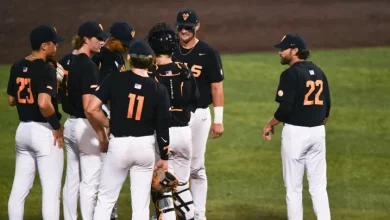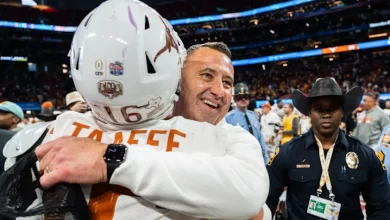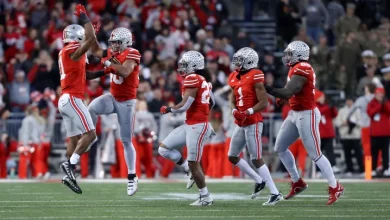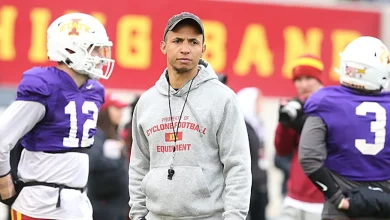This historical date in Texas: The coronavirus epidemic unexpectedly ended the Texas athletic seasons.
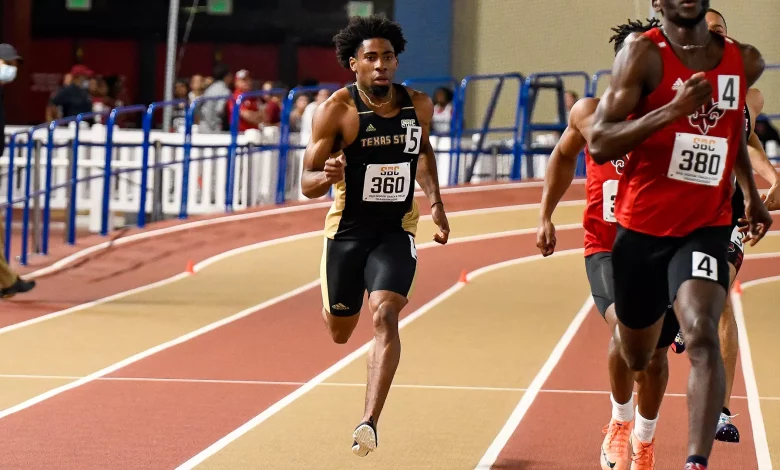
In the annals of Texas sports history, few dates will ever carry the weight and significance of March 2020, when the world — and the state of Texas — was abruptly forced to reckon with the spread of the coronavirus (COVID-19) pandemic. As the virus rapidly spread across the United States, causing widespread illness, uncertainty, and fear, the Texas athletic programs, like many others across the country, were thrust into an unprecedented situation. The moment when all Texas athletic seasons were unexpectedly canceled due to the pandemic is one that will forever remain etched in the memories of athletes, coaches, and fans alike.
This event not only affected the immediate athletic schedules for all levels of competition — from high school to collegiate and professional sports — but it also altered the way sports would be played, consumed, and appreciated for years to come. Texas, known for its larger-than-life sports culture and as a hotbed for collegiate athletics, was particularly impacted, as a range of beloved programs in football, basketball, baseball, and other sports were brought to an abrupt halt. For the athletes involved, many of whom had dedicated their lives to competing at the highest level, the virus represented the end of their seasons, careers, or dreams — all in a flash.
The Unprecedented Announcement: The Day the Games Stopped
It was on March 12, 2020, that the first major domino in the world of sports fell. The NCAA made the shocking decision to cancel its annual basketball tournaments, including the Men’s and Women’s NCAA Tournaments. This was an announcement that reverberated across the sports landscape, especially in Texas, where basketball programs, such as those at the University of Texas and Texas Tech, were already in the midst of their respective postseason runs.
For Texas fans, this news was particularly jarring. The Texas Longhorns men’s basketball team, under head coach Shaka Smart, had made significant strides that season and was gearing up for a potential deep run in the tournament. The women’s basketball team, coached by Karen Aston, had also been performing well and seemed poised for a strong postseason performance. To have the tournament canceled before either team could play their first game was a gut punch to players, coaches, and fans who had been eagerly anticipating the culmination of a season full of promise.
The cancellation of the NCAA Men’s Basketball Tournament was soon followed by similar announcements across all other collegiate sports. The Big 12 Conference, in which Texas competes, shut down its conference tournaments. This meant that all the momentum and excitement that had been building up for weeks — the suspense of a national championship chase, the thrill of the postseason — was completely extinguished.
In Texas, this hit was especially hard. The state’s deep connection to basketball, not just at the collegiate level but also in high school and AAU basketball, made the news all the more impactful. Local sports communities felt the void of canceled games and the unfulfilled potential of many student-athletes who had dedicated themselves to the pursuit of excellence.
Texas High School Sports: The Ripple Effect
While college athletics in Texas took the brunt of the impact, the high school sports scene was also deeply affected by the pandemic. The University Interscholastic League (UIL), which oversees high school sports in Texas, announced the suspension of all spring sports — including basketball, baseball, softball, track, and tennis — as COVID-19 spread through the state. This meant that thousands of high school seniors across Texas would have their final seasons cut short, and in many cases, their dreams of competing in state championships were dashed.
In Texas, high school sports are a way of life. Local communities rally behind their teams, and the pride of winning a state championship or achieving individual athletic success is unparalleled. For the seniors who had worked their entire high school careers to reach their final seasons, the cancellation was an emotional blow. The circumstances were particularly heartbreaking for student-athletes in their final year of eligibility, for whom this would be their last shot at glory in their respective sports.
At the time, many athletes expressed frustration and sadness over the lost opportunity. For some, it felt as if a significant part of their identity was being taken away without warning. The Texas high school basketball playoffs were especially gut-wrenching, as teams that had been in the midst of hot streaks and postseason runs suddenly found themselves unable to compete for the coveted state titles.
The Impact on Texas Athletics: A Sudden Halt
The athletic programs at the University of Texas, Texas A&M University, and other schools across the state were immediately impacted by the news of canceled tournaments, suspended seasons, and the uncertainty surrounding when, or if, sports would return. For student-athletes, this meant months of uncertainty regarding their futures. Many athletes who had been relying on the remainder of their seasons to boost their resumes for professional drafts or recruiting were left in limbo.
Perhaps the most significant blow came to Texas’s baseball program, one of the most storied in the country. Under David Pierce, the Longhorns had started the 2020 season with a strong 14-4 record and were looking to make a run at a College World Series berth. The abrupt cancellation of the season left many of the players devastated, as they would not get the opportunity to complete the season or potentially make history with a deep run into the postseason. The 2020 MLB Draft, which usually coincides with the end of college baseball seasons, also became a question mark for athletes who now had no way to showcase their talents in front of scouts.
Football, too, faced disruptions as spring practices were put on hold. Texas Longhorns football, under head coach Tom Herman, was preparing for its annual spring drills, where the team would hone its skills, evaluate talent, and build team chemistry ahead of the upcoming season. With the pandemic causing widespread closures, all in-person training came to a halt. For players and coaches alike, the inability to have an in-person spring practice represented a significant setback, especially for athletes who were competing for starting positions.
The Emotional Toll on Athletes and Coaches
The effects of the coronavirus pandemic were not only felt by athletes on the court, field, or track, but also by the communities that rallied behind them. Coaches, athletic staff, and fans, who pour their hearts into supporting their teams, experienced a deep sense of loss as the cancellation of seasons unfolded.
For many athletes, especially those who were seniors and had no eligibility left, the emotional toll of having their seasons and careers end so abruptly was devastating. There was no closure, no final games to savor or farewell moments with teammates. The loss of an athletic season is an inherently emotional experience, but when it happens in such a sudden and unexpected manner, it is hard to process. Many student-athletes turned to their coaches and teammates for support, forming virtual communities and holding digital meetings to stay connected in the face of isolation and uncertainty.
For coaches like Shaka Smart (Texas Men’s Basketball), David Pierce (Texas Baseball), and Tom Herman (Texas Football), this was a trying moment in their careers. They had spent months preparing their teams for the season, focusing on individual and team development, and getting players ready to compete at the highest level. But all of that work was interrupted by a pandemic that no one saw coming. As a result, coaches had to pivot to help their athletes cope with the emotional toll of the season’s cancellation while also navigating the logistical challenges of remote training, adjusting scholarship expectations, and handling eligibility concerns.
Some athletes, like those on the Texas women’s basketball team, had no choice but to watch from the sidelines as they saw their dreams of an NCAA Tournament berth dashed. The Texas women’s basketball team had put together an excellent season under head coach Karen Aston and had a legitimate shot at a high seed in the tournament. The cancellation marked the end of what would have been a landmark postseason for the team, and the disappointment was palpable.
The Return to Sports: A Slow and Cautious Rebound
After months of uncertainty, health protocols, and limited gatherings, college and professional sports slowly began their return to action later in 2020 and 2021. For Texas, this meant the resumption of practices, training, and competition under strict health and safety guidelines. The University of Texas and other Texas institutions followed guidelines from the NCAA and public health officials, limiting the number of fans allowed in stadiums, implementing rigorous testing regimens, and enforcing social distancing measures during practices and games.
While the return to play brought a sense of relief and normalcy, it also highlighted the deep scars left by the pandemic’s interruption of the sports world. Fans, players, and coaches all felt the impact of what had been lost during those months of uncertainty. However, as the world continued to adjust to the realities of living through a global pandemic, sports began to resume, providing a sense of unity and escape for fans, especially in Texas, where the love for athletics runs deep.
A Defining Moment in Texas Sports History
The abrupt end to the Texas athletic seasons in March 2020 marked one of the most difficult and disorienting moments in the state’s sports history. From the shock of canceled NCAA tournaments to the suspension of spring practices, the coronavirus pandemic completely disrupted the rhythm and flow of Texas’s sports calendar.
However, as Texas teams slowly returned to action, the resilience of athletes, coaches, and fans was on full display. The impact of the pandemic on Texas athletics will be remembered not only for the lost seasons and unfulfilled dreams but also for the lessons learned in perseverance, adaptability, and the deep sense of community that sports provide.
For many, the events of March 2020 are a stark reminder of the fragility of sport — and of life itself. But in the face of adversity, the Texas athletic spirit endures, and the memories of those lost seasons continue to fuel the drive for a future where the games go on, and the athletes who wear the burnt orange and maroon are ready to compete once again.



